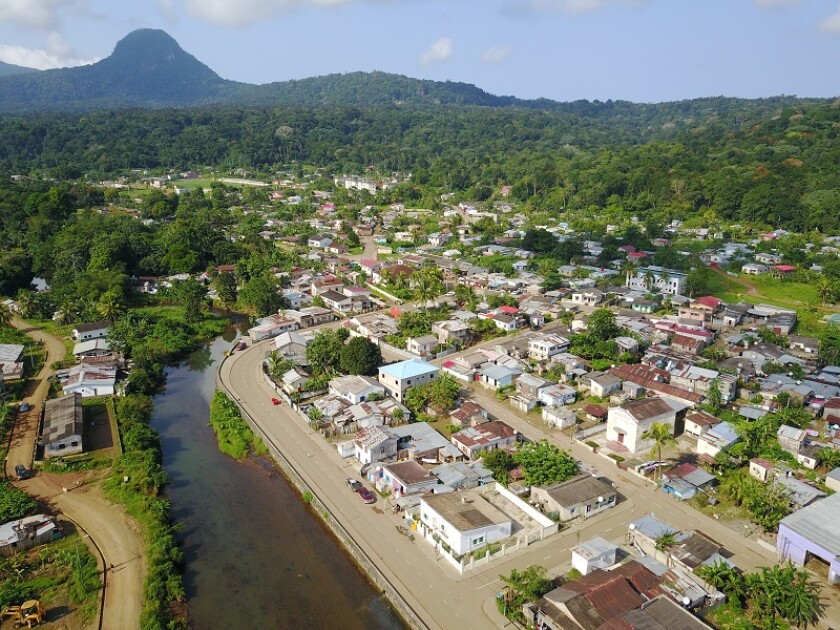São Tomé and Príncipe is strategically located in the Gulf of Guinea region, in close proximity and with easy access to the West Africa market. The Government of São Tomé and Príncipe is working to achieve sustainable economic development for the country, adopting policies to develop the free trade area and the circulation of people, goods and services and to resolve restrictions associated with non-trade barriers. São Tomé and Príncipe is entering a new epoch of its development, taking advantage from its natural, human and financial resources and also its political stability.
Foreign investment plays an important role in this process and is vital for the economic growth and development of São Tomé and Príncipe.
There are several potential sectors for investment and they include agriculture, livestock, industry, fisheries, infrastructure, services and energy.
To stimulate and develop the private sector, São Tomé and Príncipe has approved a set of legislative measures that establish favourable conditions for foreign investment and improve the country's business environment. One of the key pieces of legislation in this package to attract foreign investment was the implementation of a new São Tomé and Príncipe Investment Code (Decree-Law 19/2016 of November 17 2016) and the creation of a One-Stop Office (Decree-Law 37/2009 of October 13) for the incorporation of companies. There are also some other important new laws related to the protection of industrial property rights, tax benefits, foreign exchange and labour relations.
São Tomé and Príncipe's private investment policy is built on several general principles. These include a respect for private property, for the rules of the free market and healthy competition between economic agents and for free initiative, except in areas defined by law as being reserved for the state. The policy guarantees security and protects investments, guarantees equal treatment between national and foreigner investors and guarantees the promotion of the free movement of goods and capital, according to the law. It also pledges to respect and comply fully with international agreements and treaties.
Practical considerations
As a rule, São Tomé and Príncipe allows freedom of private investment, without it being subject to any authorisation or approval by the authorities. Nevertheless, for investments in economic activities that may contribute to the development of São Tomé and Príncipe and have a minimum value of €50,000, the investor and state may enter into an Administrative Investment Contract, regulated by the São Tomé and Príncipe Investment Code (Investment Code), which establishes the terms, conditions, forms, guarantees and incentives applicable to the investments made in the country.
The types of investments that will be subject to the Investment Code are broadly defined and may consist of several different activities. They include the transfer of financial resources from abroad or the application of own funds, and the application of foreign currency kept in bank accounts in São Tomé and Príncipe; the importing of machinery, equipment, accessories and other physical assets; the application of credit and other private investor funds that are intended to finance entrepreneurial activities; the application of technology and know-how; the creation of new companies exclusively belonging to the private investor; the development of real estate projects, tourist-focused or not, regardless of the legal nature they assume; and corporate finance, etc. These investments will also be eligible to incentives under the Tax Benefits Code.
The Investment Code offers three investment regimes:
Simplified regime – for investments valued between €50,000 and €249,999
General regime – for investments valued between €250,000 and up to but not including €5 million
Special regime – for investments worth €5 million or more
The value of the investment determines the types of tax incentives and benefits available to the investors.
Private investment projects are subject to an investment agreement (Administrative Investment Contract) through which investors benefit from a unique package of perks, including: investment protection, particularly with regard to compulsory purchases; a guaranteed right to expatriate the proceeds of the investments abroad, such as royalties, profits and dividends; the right to import goods directly from abroad and to export the products produced; a guarantee of non-interference by the state in the management of privately-owned enterprises; the possibility of the provision of land necessary for the development of a project; and the abovementioned possibility of tax and customs concessions.
The Tax Benefits Code (Decree-Law 15/2016 of November 17 2016) grants investors general and special benefits and incentives. Certain incentives are granted automatically while others depend on further action by the investor and recognition by the authorities.
The general incentives include:
An exemption from import duties for goods and equipment used for new activities or the expansion of existing activities (provided that the relevant goods and equipment cannot be sourced in São Tomé and Príncipe).
A corporate income tax rate of 10%.
Accelerated depreciation and amortisation for investments in the tourism, education, health, new technologies and export sectors (it consists of applying twice the normal rates, legally fixed for the calculation of depreciation and amortisation considered as costs attributable to the fiscal exercise in determining the taxable income).
Tax deductions for investment in specialised equipment for the development of activities that are authorised under the Investment Code during the first five years of activity.
Tax deductions for training costs of São Tomé and Príncipe staff.
Tax deductions during the first five years of activity of costs relating to the construction and restoration of roads, water supply, electricity, energy, schools, hospitals and other public works. These deductions amount to 150%, if the activities are in the districts of Cantagalo, Lembá, Lobata, Caué or in Príncipe; and 100%, if the activities are in the other districts.
Exemption of stamp duty during five years in case of amendment of articles of association.
Exemption from SISA tax on acquisition of real estate.
In addition to general incentives there are also some special tax incentives for investments in agriculture, agro-industries, livestock and fisheries sectors. These include an exemption from import duties of goods and equipment; a 50% reduction of the corporate income tax rate for the first seven years of the project's implementation; and 0.2% stamp duty tax on banking operations in connection with the import of foreign capital.
The hospitality sector can also tap into special incentives, which target the restoration, construction, expansion or modernisation of hotels and related establishments and the development of rural and eco-tourism. Companies involved in international trading receive specific advantageous tax treatment and are subject to a flat income tax rate of 5%.
Furthermore, the Tax Benefits Code provides that additional incentives are available for high value projects exceeding $10 million.
Future hopes
Of all these legislative developments one the most relevant measures implemented in São Tomé and Príncipe is the creation of the One-Stop Office for the incorporation of companies, which simplifies the procedure of incorporating and registering a business. The One-Stop Office provides investors with the different legal forms for companies that can operate in São Tomé and Príncipe and which can be used as vehicles for investments, such as the limited liability company (SA) and the private (and single-member private) limited liability company.
São Tomé and Príncipe now has the minimum legal and institutional measures in place to welcome all investors intending to do business in this unique market, taking advantage of both its strategic location and natural resources.
Joana Andrade Correia
Partner
Raposo Bernardo
Lisbon, Portugal
Tel: +351 21 3121330
Joana Andrade Correia has co-headed Raposo Bernardo's corporate and M&A department for 18 years. She has led multiple domestic and international operations, including corporate restructurings and M&A transactions for key players in different sectors such as banking and finance, aviation, tourism and energy, among others.
Recent work includes advising Icelandair Airlines on the privatisation of the National Airline of Cape Verde; Iberostar Hotels and Resorts Group in its business incorporation in Portugal and opening of two hotels; Deutsche Bank in the negotiation and preparation of a bank financing agreement relating to the acquisition of commercial aircrafts; China Africa Development Bank on financing of investments in infrastructure and construction projects; Afreximbank on the financing of the construction of a Hilton hotel; and Elix Capital on transactions involving airlines and aircraft leasing companies, acquisitions and leveraged financings.
Júlio Martins Júnior
Managing associate
Raposo Bernardo
Lisbon, Portugal
Tel: + 351 21 3121330
Júlio Martins Júnior is member of both the Cape Verdean and the Portuguese bar associations.
Júlio has 15 years of experience in corporate law and finance related operations, namely in relation to sales and acquisitions of shares and assets, financing operations, licensing and regulation and M&A.
Júlio has led and been involved in major international investment projects. His recent transactions include advising over 30 banks operating in the country on financing contracts for large infrastructure and equipment; acting as counsel to the largest private bank in Cape Verde; advising the national aviation company TACV, still the largest privatisation in the country; assisting CV Telecom on a project to construct the second submarine cable connecting South Africa, Cape Verde and Portugal; and advising China Construction Bank on a loan agreement for an international credit transaction.
He has been part of the teams drafting some of the most recent legislation packages for Cape Verde.


